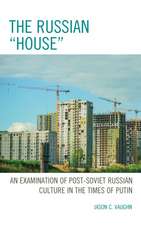KOREAN WAVE EVOLUTION FANDOM
en Limba Engleză Paperback – 10 iun 2019
Preț: 422.30 lei
Nou
Puncte Express: 633
Preț estimativ în valută:
80.83€ • 87.83$ • 67.94£
80.83€ • 87.83$ • 67.94£
Carte tipărită la comandă
Livrare economică 21 aprilie-05 mai
Preluare comenzi: 021 569.72.76
Specificații
ISBN-13: 9781498555586
ISBN-10: 1498555586
Pagini: 300
Dimensiuni: 152 x 229 x 22 mm
Greutate: 0.44 kg
Editura: Rowman & Littlefield
ISBN-10: 1498555586
Pagini: 300
Dimensiuni: 152 x 229 x 22 mm
Greutate: 0.44 kg
Editura: Rowman & Littlefield
Notă biografică
Cuprins
Descriere
This collection examines the spread and popularity of South Korean popular culture and its global effects over the last twenty years. The contributors analyze the theoretical and institutional history of this development, its relationship with other globalizing forces, and the industrialization of cultural production in South Korea.

























